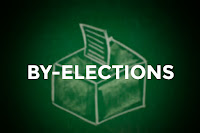
When electing a group of people, such as a congress, council, or committee, you need to decide which philosophy of representation that you would like to use. At a very high level, there are two basic options: proportional representation or majoritarian representation.
Proportional Representation
As an example, we'll use a hypothetical election of the U.S. House of Representatives described by
Daily Kos and illustrated by the diagram above. The Daily Kos article hypothesizes what the House might look like if U.S. elections used proportional representation. You can see 9 different political parties with different levels of support.
With proportional representation, the percentage of seats held by a party will be approximately equal to their percent support by the voters. In this example, about 6% of voters prefer the Green party, so the Green party gets 26 of the 435 seats or about 6% of the seats.
The most common voting methods that provide proportional representation are the
single transferable vote (STV), party list voting, and mixed member proportional representation. STV is the only one that makes sense for non-government elections since the other two are based on political parties. OpaVote provides several variations of STV including Scottish STV, Meek STV, and ERS97 STV.
 Sometimes it happens that an elected office becomes unexpectedly vacant. The person who held the office may resign, be kicked out, or have died. When this happens, the office may remain vacant until the next scheduled election or a special election or by-election may be held specifically to fill the vacant seat.
Sometimes it happens that an elected office becomes unexpectedly vacant. The person who held the office may resign, be kicked out, or have died. When this happens, the office may remain vacant until the next scheduled election or a special election or by-election may be held specifically to fill the vacant seat.
